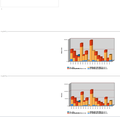
Inline images do not in their correct place, but instead listed at the bottom of the email.
I receive many html formatted emails with tables and graphs as inline images, generated from a Microsoft SSRS server. The images do not appear in the correct place, instead listed as both attachments and displayed images out of context with the rest of the message body below causing the email format to be poorly displayed. If I export the email to an "eml" type file and use an ordinary eml viewer program, the email is displayed correctly. The error console throws several dozen warnings when the message is opened about unknown properties ("writing-mode" and "layout-flow"). Any way to get these graph images to display in their correct position within the message body?
All Replies (5)
Sounds like you are viewing the emails in Plain Text format which strips all formatting and attaches any images that were otherwise embedded in content.
'View' > 'Message Body as' > 'select 'Original HTML'
No, the setting you suggest is already on. There are HTML tables within the email that are heavily formatted for color and text and show perfectly, it's just the graphs as inline images don't show. You can see the image box where the image is supposed to go, but it is empty as if it was a broken link and the image shows as an attachment instead (as well as displayed in full at the bottom of the email instead of in the image box where it's suppose to be). It's hard to do a screenshot because of the amount of detail, the entire email is typically several pages long. I will see if I can figure out something to show...
Sounds like those images were containing remote content which is blocked automatically by Thunderbird to safeguard your privacy.
Do you see a message below the headers, but above the content of the email which says: 'To protect your privacy, thunderbird has blocked remote content in this message' ?
If the email is in the 'Junk' folder then you will not see the message until you move the email into the Inbox folder. some additional info: http://kb.mozillazine.org/Images_in_messages_do_not_appear
No, it's not because the content is blocked, but I think the link you listed above did more or less hint the problem. In that link, there is a point about Thunderbird not handling inline images or other formatting when the source is using MS specific HTML coding when an email is written with Word embedded in Outlook. In this case, the email is being generated by MS SQL Server Reporting Services which I suspect may be doing some of the same kind of thing. Looks like there's no simple solution, and I'll just have to live with it as is. I did attach two images though, just to show, zoomed way out try to get everything in. You can see the image placeholders with the formatted table, and then the images show below as attachment parts.
Droid13 trɔe
I agree with you regarding the MSWord/Outlook issue.
It is always better to add MSWord/Adobe etc documents as an attachment so the recipient can open it in the correct program and view the content as it was intended to be seen. You could try requesting the information is sent as an attachment and not as actual email content. The sender may not realise they are sending emails that are not able to be read as intended.


